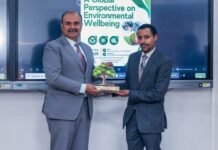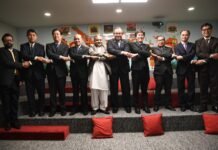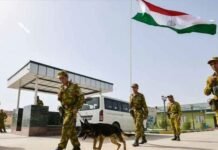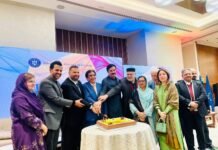Geneva, 29 May 2022 (TDI): The 75th World Health Assembly awards ceremony was held in Geneva. Awards were given to a group of people from across the globe. The recognition was for their exceptional contributions to public health.
Dr. Tedros Adhanom Ghebreyesus, Director-General of the World Health Organization, opened the award ceremony.
“The 2022 public health prizes and awards celebrate people and institutions for successfully addressing a huge array of health challenges around the world. It is an honor for us to come together to acknowledge these true champions of health. I thank the foundations and institutions who so generally support these awards,” he stated.
Many of the awards were in remembrance of distinguished public health workers. Every year, a request for nominations for each prize is set out. This occurred following the conclusion of the World Health Assembly.
National health administrations of WHO Member States, as well as previous prize winners, submitted nominations. The Executive Board chose the winners for 2022 at the 150th meeting in January 2022.
The recommendations of the dedicated selection panels for each prize led to the selection of winners.
Winners of the 2022 prizes
Ihsan Doğramacı, Family Health Foundation Prize
Award winner: Professor Mehmet Haberal, Turkey
Professor Haberal is a founder in the fields of general surgery, transplantation, and burn treatment. He was instrumental in establishing a legal foundation for organ transplantation that took place in Turkey.
This was accomplished while also improving its social acceptability. The accomplishment came by taking a comprehensive approach to family and community health. They collaborated with relatives of seriously ill patients as well as religious authorities.
His leadership and participation led to the creation of many centers that transplant organs. These centers are in Turkey. The number of trained health professionals in this sector of employment has increased. His collaboration and leadership span national, regional, and global entities.
Sasakawa Health Prize
Award winner: Dr Paisan Ruamviboonsuk, Thailand
Dr. Ruamviboonsuk is an ophthalmologist specializing in retinal eye care. He has spent the last 25 years focusing on diabetic retinopathy. This is Thailand’s second major cause of blindness.
He developed and began employing a unique screening process. He then started a trial program to teach non-ophthalmologists how to utilize it. They can now correctly detect retinopathies anywhere in Thailand. They can detect even in the most remote locations due to their training.
Diabetic retinopathy screening is now a nationwide program as a result of his efforts. The Ministry of Public Health runs this and it is open to the public at no cost.
United Arab Emirates Health Foundation Prize
Award winner: Nicaragua’s Network for Fighting Malaria
The implementation of a countrywide malaria control program has been continuing. It has been continuing for more than 50 years. The National Malaria Component of Nicaragua’s Ministry of Citizen Power for Health has been instrumental in the implementation.
In addition, the community network of voluntary collaborators (ColVol) has also been essential. A group of local health workers is leading the way in terms of community participation. They are reaching out to far-flung and ethnically diverse populations.
They concentrate on malaria surveillance, diagnosis, and treatment in the Nicaraguan municipality of Puerto Cabezas, ColVol. Malaria has become much less of a problem in the populations addressed.
His Highness Sheikh Sabah Al-Ahmad Al-Jaber Al-Sabah Prize for Research in Health Care for the Elderly and in Health Promotion
Award winner: Dr. Hanadi Khamis Mubarak Al Hamad, Qatar
Dr. Hanadi Al Hamad is Qatar’s national lead for healthy aging, at the Ministry of Public Health. She is a senior clinical leader for geriatric, long-term care, and rehabilitation services. She has been a driving force behind the creation of new programs.

These programs include geriatric virtual clinics for the elderly and an urgent day-care center in Qatar. The number of beds available for long-term care has increased by 20%. As a result of her excellent job, this has happened.
The integration of mobile and home-care services is now complete. Information about healthy aging is now available on a dedicated web page for seniors. Community rehabilitation and memory clinic services have grown at the primary care level.
Dr. LEE Jong-wook Memorial Prize for Public Health
Award winners: Professor Prakit Vathesatogkit, Thailand, and the Severe Hypothermia Treatment Centre, Poland
Professor Prakit Vathesatogkit has been Executive Secretary of the Action on Smoking and Health (ASH) Foundation since 1986. He is a member of the National Committee for the Control of Tobacco Use at the Ministry of Public Health of Thailand.
Professor Vathesatogkit has dedicated his professional life to the fight against tobacco use. It has resulted in an outstanding array of tobacco control measures. It has also improved treatment and care regimens for patients.
Tobacco taxes, limits on tobacco advertising, and sports sponsorship are all part of the plan. Professor Vathesatogkit is a trailblazer in the fight for these reforms. He works in a variety of fields. He engages the public and builds and empowers networks.
Severe Hypothermia Treatment Centre is the first Polish facility the sole purpose of which was to cure hypothermic individuals. It was one of the earliest medical centers in the world that specialized in treating accidental hypothermia.
Dr. Tomasz Darocha and Dr. Sylweriusz Kosiski founded the Centre. Dr. Tomasz Darocha is a specialist in extracorporeal therapy. Dr. Sylweriusz Kosiski is an anesthesiologist and intensive care expert.
The Severe Hypothermia Treatment Centre has started several research and development projects. The purpose is to develop cutting-edge technology solutions. They find and make the treatment of hypothermia.
Ground-breaking work in mountain rescue teams has also been done. Training is taking place for first responders to save lives. The Centre’s broad team of doctors and professionals combines medical and scientific work with social work.
Acknowledging “urban hypothermia” is a concern. They are, as well, acknowledging the social aspect of accidental hypothermia. This includes a focus on the importance of hypothermia awareness among people at risk. People experiencing homelessness or poverty, for example.
Nelson Mandela Award for Health Promotion
Award winner: Dr Wu Zunyou, China
Dr. Zunyou Wu is the Chief Epidemiologist at the Chinese Center for Disease Control and Prevention. The world should honor him for his contributions to HIV/AIDS prevention. This includes the innovative, evidence-based policies he has developed to reach HIV/AIDS-affected people.
He was a trailblazer when it came to developing, implementing, and scaling up outreach programs for sex workers. Dr. Wu started China’s first needle exchange program. He also started the country’s first large-scale opioid substitution therapy.
Dr. Wu has also introduced universal testing and antiretroviral therapy among HIV-infected men who have sex with men.
These measures led to a decrease in the number of new HIV infections in 20 cities in #China https://t.co/Fwo57LLJkD #WHA75 https://t.co/YfW82dAaDR— World Health Organization (WHO) (@WHO) May 27, 2022
These initiatives have had a substantial impact. Drug users now account for 1% of all HIV infections in China, whereas they accounted for half in 2004. As a result of Dr. Wu’s efforts, HIV testing is now a vital preventative tool across all vulnerable groups.
In China, there were almost 300 million test results in 2020. The adopted national policy was Dr. Wu’s idea for outreach to vulnerable groups.








